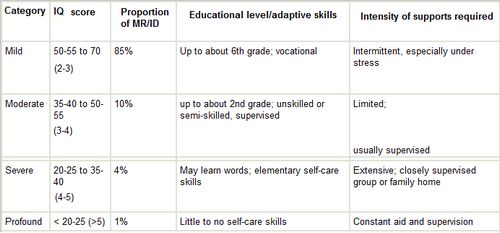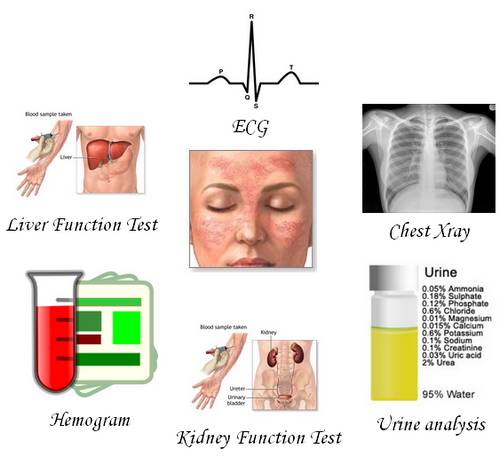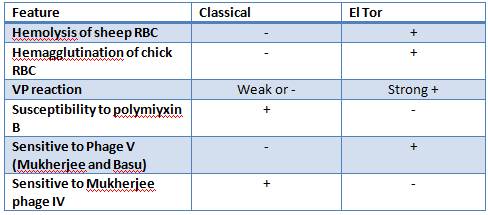Intellectual Disability: Causes, Presentation and Treatment

Mental retardation (MR) or intellectual disability (ID) is a descriptive term for sub average intelligence and impaired adaptive functioning arising in the developmental period (< 18 yr).
Causes
Mental retardation affects about 1 – 3% of the population. There are many causes of mental retardation, but specific reason can only be found in only 25% of cases. Causes of mental retardation can be roughly categorized as:
A) Infections (present at birth or occurring after birth)
- Congenital CMV
- Congenital rubella
- Congenital toxoplasmosis
- Encephalitis
- HIV infection
- Listeriosis
- Meningitis
B) Chromosomal abnormalities
- Chromosome deletions
- Chromosomal translocations
- Defects in the chromosome or chromosomal inheritance (Eg- fragile X syndrome, Angelman syndrome, Prader-Willi syndrome)
- Errors of chromosome numbers (such as Down syndrome)
C) Genetic abnormalities and inherited metabolic disorders
- Adrenoleukodystrophy
- Galactosemia
- Hunter syndrome
- Hurler syndrome
- Lesch-Nyhan syndrome
- Phenylketonuria
- Rett syndrome
- Sanfilippo syndrome
- Tay-Sachs disease
- Tuberous sclerosis
D) Metabolic
- Congenital hypothyroid
- Hypoglycemia (poorly regulated diabetes)
- Reye syndrome
- Hyperbilirubinemia (very high bilirubin levels in babies)
E) Nutritional
- Malnutrition
F) Toxic
- Intrauterine exposure to alcohol, cocaine, amphetamines, and other drugs
- Lead poisoning
- Methylmercury poisoning
G) Trauma (before and after birth)
- Intracranial hemorrhage before or after birth
- Lack of oxygen to the brain before, during, or after birth
- Severe head injury
H) Unexplained
Symptoms
A family may suspect mental retardation if the child’s motor skills, language skills, cognitive and social skills do not seem to be developing, or are developing at a far slower rate than the expected. The degree of impairment from mental retardation varies widely, from profoundly impaired to mild or borderline retardation. Failure to adapt normally and grow intellectually may become apparent early in a child’s life. In the case of mild retardation, these failures may not become recognizable until school age or later.
- Language delay: One of the first signs may be language delays, including expressive language (speech) and receptive language (understanding). Danger sign include no mama/dada/babbling by 12 months, no 2-word phrases by age 2, and parents reporting they are concerned that the child may be deaf.
- Fine motor/adaptive delay: Significant delays in activities such as self-feeding, toileting, and dressing.
- Gross motor: Subtle delays in gross motor acquisition, or clumsiness.
- Cognitive delay: Difficulties with memory, problem-solving and logical reasoning.
- Social delays: Lack of interest in age-appropriate toys and delays in imaginative play and reciprocal play with age-matched peers.
Family history: It is recommend that the evaluation of a child with MR should include an extensive family history, with particular attention to family members with mental retardation, developmental delays, consanguinity, psychiatric diagnoses, congenital malformations, miscarriages, stillbirths, and early childhood deaths.
Exams and Tests
The diagnosis of MR requires an intelligence deficit of at least 2 standard deviations (SDs) below the mean IQ. Equivalent deficits in at least 2 areas of functional life skills or adaptive skills also must be present to meet the diagnostic criteria for MR. Adaptive skills encompass functional life skills within the domains of communication, self-care, home living, social and interpersonal skills, use of community resources, self-direction, functional academic skills, work, leisure, health, and safety.
IQ scores can vary based on age, instrument, and practitioner. IQ scores can be measured using assessment instruments, such as the Stanford-Binet, Wechsler Adult Intelligence Scale (WAIS), or Wechsler Intelligence Scale for Children (WISC-IV). Nonverbal children can be tested with the Leiter International Performance Scale (Leiter-R).
The second component of diagnosis, adaptive skills, is usually measured with a self-reported or parent/caregiver-reported inventory, such as the Vineland Adaptive Behavior Scales, Second Edition (VABS-II).
The primary goal of treatment is to develop the person’s potential to the fullest. Special education and training may begin as early as infancy. This includes social skills to help the person function as normally as possible. It is important for a specialist to evaluate the person for other affective disorders and treat those disorders. Behavioral approaches are important for people with mental retardation.
No specific pharmacologic treatment is available for cognitive impairment in the developing child or adult with MR. Medications, when prescribed, are targeted to specific comorbid psychiatric disease or behavioral disturbances.
Prevention
- Genetic: Prenatal screening for genetic defects and genetic counseling for families at risk for known inherited disorders can decrease the risk of inherited mental retardation.
- Toxic: Environmental programs to reduce exposure to lead, mercury, and other toxins will reduce toxin-associated retardation. Increased public awareness of the risks of alcohol and drugs during pregnancy can help reduce the incidence of retardation.
- Infectious: The prevention of congenital rubella syndrome is probably one of the best examples of a successful program to prevent one form of mental retardation. Constant vigilance helps reduce retardation that results from infection.







1 Comment
As a an advocate for disability rights, I would just like to remind you that Rosa’s Law in 2010 stated that “mental retardation” is no longer an appropriate or used term in the medical field. It has since been replaced with “Intellectual Disability.” The use of the “r-word” is extremely offensive towards persons with disabilities, and I respectfully ask you to please rename this page.
http://www.r-word.org
Comments are closed.